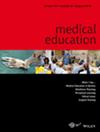(Mis)Alignment in resident and advisor co-regulated learning in competency-based training
Abstract
Background/Objective
In implementing competence-based medical education (CBME), some Canadian residency programmes recruit clinicians to function as Academic Advisors (AAs). AAs are expected to help monitor residents' progress, coach them longitudinally, and serve as sources of co-regulated learning (Co-RL) to support their developing self-regulated learning (SRL) abilities. Implementing the AA role is optional, meaning each residency programme must decide whether and how to implement it, which could generate uncertainty and heterogeneity in how effectively AAs will “monitor and advise” residents. We sought to clarify how AA-resident dyads collaboratively interpret assessment data from multiple sources, co-create learning goals and action plans and attempt to enhance residents' SRL skills.
Methods
Shortly after each of their six meetings during two years of Internal Medicine residency, we conducted individual, brief interviews with AAs (N = 10) and residents (N = 10). We analysed transcripts using an abductive framework with theory-based and evidence-based sensitizing concepts.
Results
We collected 49 residents and 36 AA ‘meeting debriefs’, which produced rich data on how dyads variably engaged in SRL and Co-RL. Residents and AAs adopted “learning stances” that oriented their perceptions and approaches to Co-RL. Their stances did not always align within dyads. We found unique patterns in how stances evolved or devolved over time, and in how these changes impacted dyads' Co-RL processes. While some dyads evolved to engage in proactive co-regulation, most stayed consistent or oscillated reactively in their relationships, with little apparent Co-RL focused on helping residents to develop clinical competencies through SRL. We catalogued multiple influential sources of regulation of learning.
Conclusion
The conceptually ideal form of Co-RL was not consistently achieved in this well-intended implementation of AA-resident dyads. To better translate ‘coaching over time’ from intention to practice, we recommend that residency programmes use Co-RL principles to refine CBME processes, including refining assessment tools, resident orientation sessions and faculty development practices.





 求助内容:
求助内容: 应助结果提醒方式:
应助结果提醒方式:


